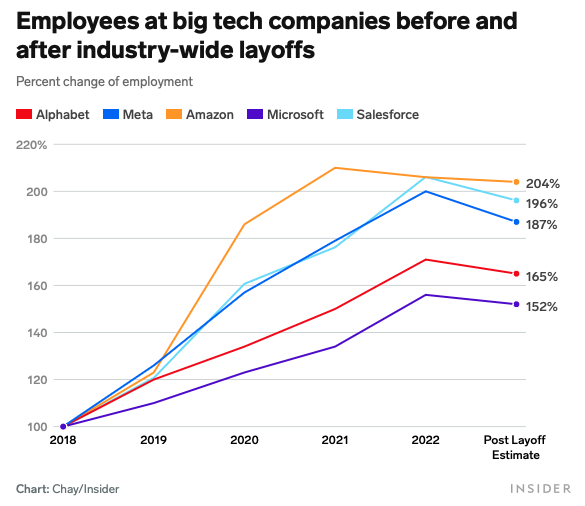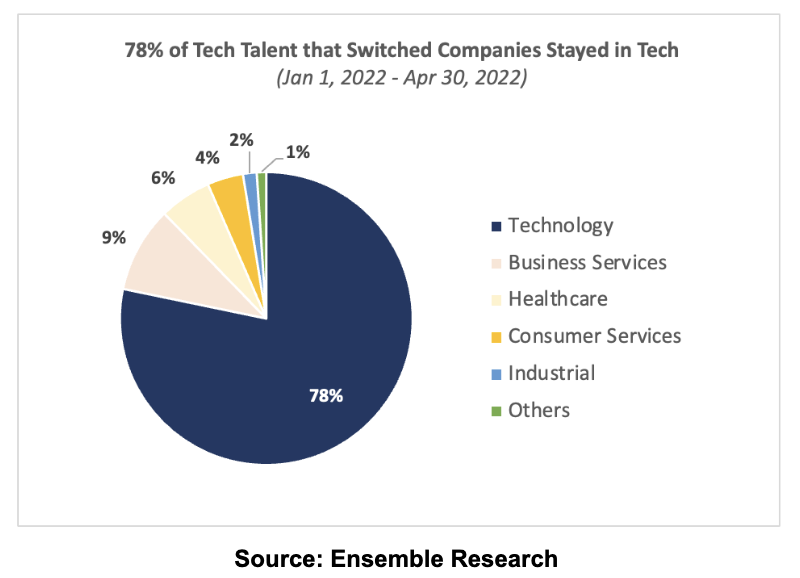The Unexpected Potential Benefit of Tech Layoffs (article originally posted by Kaihan Krippendorff)
May 01, 2023
This article was originally posted on LinkedIn at this link
Last week, Lyft’s new CEO, David Risher, announced plans to cut at least 1,200 jobs. Overall, tech companies have laid off 183,801 global workers so far this year, according to Layoffs.fyi. This adds to the total of 159,684 tech employees who were laid off in 2022. Companies cite several factors contributing to widespread layoffs: a weakened economy, higher inflation rates, and rightsizing after over-hiring post-COVID-19.
We think many are overlooking the potentially transformative impact this could have not on the tech sector but on all other sectors because, you see, not all of these job seekers will return to the tech industry. Many will bring their skills to non-tech sectors. Non-tech companies have been clamoring for years to hire tech talent, and these layoffs could present a windfall opportunity for non-tech companies across industries to finally close the gap between the demands of digital evolution and the talent needed to fulfill on its potential.

In order to transform to a truly digital and customer-centric company, organizations need to master a few things: shareable data and analytics to support moment-of-use production and provision, and real-time learning systems that can adapt and respond to a constantly changing environment. What has been holding many non-tech industries back is the lack of talent to support the transition to digital. But there are two major shifts afoot that may impact non-tech companies’ outlook for digital transformation:
- Widespread artificial intelligence (AI) options to enhance productivity
- More than 100,000 tech workers out of jobs
AI enhancing productivity
Amidst tech layoffs in 2022 and 2023 was the release of ChatGPT in November 2022. In just five days, the AI chatbot had obtained one million users. While automation has also been listed as an explanation for recent layoffs, advancements in AI may help companies solve the talent shortage by amplifying the output of skilled workers.
With employees using AI, even non-tech companies may feel less of an impact of hiring shortages. Coupled with the increased number of tech workers looking for jobs and capable of leveraging AI, this could have a tremendous impact on digitalization across industries.
Tech workers moving to other industries
As tech workers resettle, some are landing in what were traditionally non-tech fields. According to Vox, the biggest and fastest-growing industries for tech professionals are finance, manufacturing, and healthcare. In conversations with Outthinker Network heads of strategy, companies from media, publishing, professional services, banking, and insurance all are seeking, sometimes frantically, for tech talent to support their digital transformation efforts.

According to LinkedIn, “technology-savvy skills” were among the top five skills employers want to see on resumes in 2023.
“Staying current with the latest technology is expected from any potential employee, notwithstanding the industry they are set to be involved in,” explained Samira Shihab, founder of Tinkerlust and Stellar Women, Indonesia, in the article.
Talent arenas
For years, strategy and management expert Rita Gunther McGrath has predicted that companies would need to think of strategy and competition in terms of competitive arenas, not industries. Leaders would do well to apply this thinking to talent, too.
An industry-lens based on products and supply chain efficiencies is severely limited when you consider the experiences customers want to have and the type of work employees want to do. Arenas are sets of resources a customer needs, with different players involved in providing those resources.
For example, Best Buy realized that customers don’t only want to buy a TV—they want the TV mounted, connected to cable and the internet, and able to access subscription services. Former CEO Hubert Joly invested in finding and training the right talent to offer knowledge on that complete set of resources.
Conclusion
As emerging technologies become widely adopted and industry boundaries continue to blur, it will become hard to distinguish what differentiates a tech company from a non-tech company. Soon “tech talent” might simply become “talent”, and formerly laid-off tech employees may be the reason behind the digital evolution of companies across arenas.

